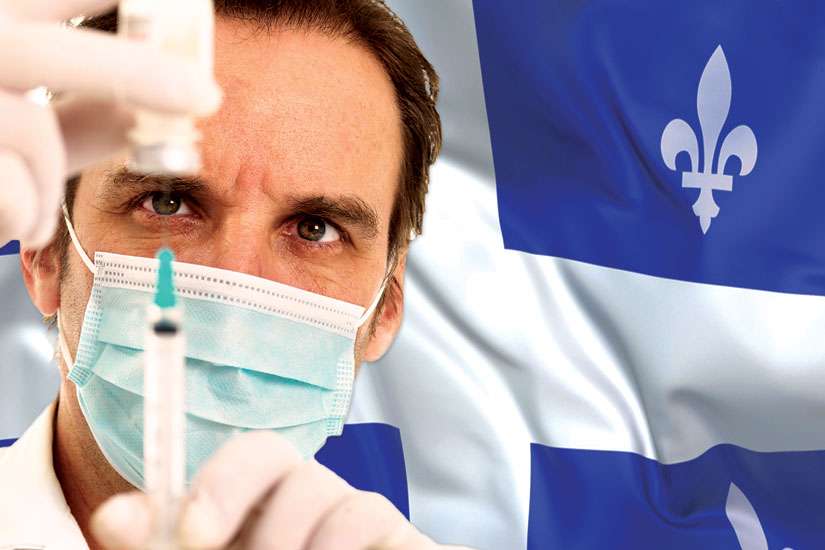The Quebec Court of Appeal overruled an injunction that had been granted Dec. 1 by a lower court after an appeal to block euthanasia launched by Montreal Physician Dr. Paul Saba and a disabled woman Lisa D'Amico.
In its Dec. 22 ruling, the Court of Appeal declared Quebec's euthanasia law valid in light of last February's Supreme Court of Canada decision that struck down the Criminal Code prohibition against assisted suicide. Canada's high court gave the federal government 12 months to come up with new law to regulate assisted suicide. During this legislative vacuum, Quebec's Appeal Court said the province was justified to proceed with its euthanasia legislation.
However, the Appeal Court also said that Quebec may eventually be compelled to abide by the federal Criminal Code when Parliament passes assisted suicide law sometime in 2016. If Parliament eventually adopts legislation that is at odds with the way medical aid in dying is applied in Quebec, it will then be necessary to re-examine Quebec's Bill-52 to see how it conflicts within the larger legislative framework, the Quebec court said.
The Appeal Court also said that those who oppose Bill-52 have a right to continue to voice their objection and launch further appeals.
"We going back to court," said Dr. Saba. "We're going to keep fighting this."
"The solution to this is not euthanasia," he said. "Doctors are not God. We don't know when people are going to die."
Saba, who is president of the Coalition of Physicians for Social Justice, said Quebec should provide good palliative care rather than opt for lethal injections.
The focus will now shift to the Supreme Court of Canada which will hear arguments Jan. 11 on the federal government's request for a six-month extension until Aug. 6 to draft new laws concerning assisted suicide.
The high court will also consider whether Quebec can receive an exemption from the extension and proceed with its so-called "medical aid in dying" euthanasia law, which it implemented Dec. 10. The federal government does not oppose Quebec's request for an exemption.
The federal Attorney General has requested the additional six months for Parliament to craft legislation in response to the Supreme Court ruling last February which struck down as unconstitutional the Criminal Code's blanket ban on assisted suicide.
Euthanasia Prevention Coalition (EPC) executive director Alex Schadenberg said the "politics is very interesting." He noted the federal government intervened on the side of Dr. Saba in late November, but have now changed their position in favor of allowing an exemption.
The EPC intervened in Dr. Saba's action.
"It's our view the intentional killing of patients by doctors is not health care and falls outside the jurisdiction of the Quebec legislature," said EPC legal counsel Hugh Scher,
The EPC also opposes the SCC granting Quebec an exemption.
"If Quebec is exempt from the extension and there's a Quebec case going to the Supreme Court challenging the law, we have a very interesting situation," said Schadenberg. "Granting them an
extension would say the law is acceptable."
Schadenberg stressed the Supreme Court struck down laws against assisted suicide, but not euthanasia.
"Euthanasia can only be legalized by an exemption to the Criminal Code," he said. "The Supreme Court did not legalize wide-open euthanasia."
The position is reinforced in an an affidavit submitted by Dr. Will Johnston on behalf of the EPC.
"EPC is committed to having the boundaries of the law relative to homicide and assisted suicide determined by Parliament and not by provincial legislatures as we submit that this is fundamentally a matter properly
reserved for Parliament, a point repeatedly made by this court," it said.
If Quebec is granted an exemption, that would mean "federally there is a homicide law in place, yet in Quebec, they would be doing euthanasia, which is lethal injection, which is homicide," said Schadenberg. "The Quebec law should be null and void until the federal law is in place."
Quebec Superior Court Judge Michel Pinsonnault, who had granted the Dec. 1 injunction, took a similar position, ruling "medical aid in dying" was in fact a euphemism for euthanasia, which is still illegal under the Criminal Code until the Supreme Court decision comes into effect or Parliament crafts a new law.
Quebec has argued medical aid in dying is health care and under provincial jurisdiction. Quebec has instructed its prosecutors not to prosecute any charges under the Criminal Code of doctors who give lethal injections under the so-called medical aid in dying law.
Schadenberg said he was not surprised by the Quebec Court of Appeal ruling.
Schadenberg and other euthanasia opponents have also expressed concern the federal External Panel on Options for a Legislative Response to Carter v Canada report has not been released publicly, allowing the "radical" provincial-territorial panel released Dec. 14 to frame the debate.
The non-partisan federal panel, struck by the Harper government last summer, made its final report to cabinet on Dec. 15. The Provincial-Territorial Advisory Group on Physician-Assisted Dying published its pro-euthanasia recommendations the day before, including euthanasia for children who are deemed to have the capacity to consent.
"By releasing the provincial report before the federal report, the public debate is shaped by the radical nature of the provincial report," said the Association for Reformed Political Action (ARPA) Canada in a Dec. 17 news release.
"It does appear the provincial-territorial report, essentially put together by the Ontario government and made up of a majority of pro-euthanasia leaders is going to control the debate," said Schadenberg.
Ian McLeod, a spokesman for Justice Minister Jody Wilson-Raybould, said the report was delivered in English and needs to be translated into French before it will be released to the public. He said the report would be "available in the next few weeks."
(With files from Alan Hustak)


